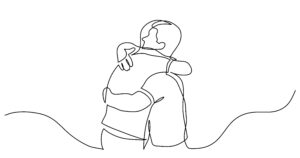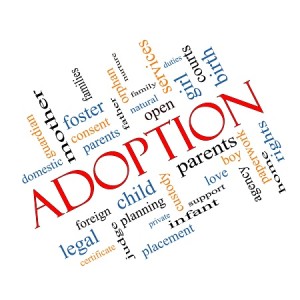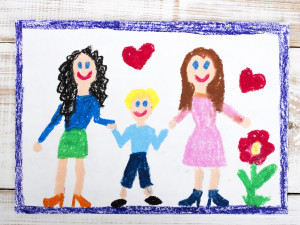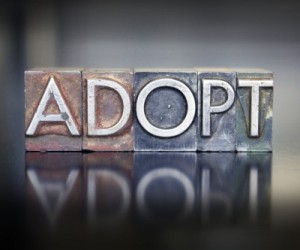The door was open and a “frail little voice” called out for the brothers to come inside.


ays and lesbians in the Czech Republic can live in an officially registered partnership since 2016, when the Czech parliament changed the law. But while it granted the partners similar rights enjoyed by heterosexual married couples, such as rights to inheritance, it did not allow them to adopt children. That now has changed with Tuesday’s ruling of the Constitutional Court.
Adéla Horáková, a lawyer for PROUD, a Czech initiative promoting the rights of homosexuals, says the ruling is a small step ahead, but stresses that there are still many further moves to take:
“It is something that was almost inevitable from the beginning of adoption of this provision, because it is clearly unconstitutional and illogical. There are many other inequalities given by law for same sex couples as parents or just as couples. One of them being the fact that they cannot get married, another can be that they cannot adopt jointly a child or that a partner may not adopt biological child of his or her partner, so called second parent adoption.”
The decision of the Constitutional Court is essential not only for some 1,800 gays and lesbians living in registered partnership, but also for those who might have postponed the registration due to the ban on adoption. Adéla Horáková says it is difficult to say how many people will actually take advantage of the ruling:
“It is hard to estimate how many gays and lesbians change their opinion or will feel the impulse to apply for adoption. We hope the more the better so that we can see more same sex parents adopting children and show the society they are just as capable and just as loving parents as anybody else.”
29-06-2016 15:02 | Ruth Fraňková, Radio.CZ
Click here to read the entire article.
While certain countries still struggle with the concept of our families being equal to all others, in America, the foundation for gay parents adopting has been set and the legal protections for these families are available and critical to creating security in these family structures. There are several means by which gay parents adoption can occur. I will review the most common: private adoption, public adoption and second or step parent adoption.
Private Adoption – There are several reasons that parents looking to adopt a child may look into private adoption, sometimes referred to as domestic adoption. The availability of children is higher than most people expect. In the most recent year for which accurate data exists, there were over 18,000 domestic non-relative adoptions of newborns within the United States. Although the number of people placing their children for adoption has fallen dramatically since the 1970s due to the stigma of single-parenthood thankfully decreasing, there are still many birth parents making the painful but loving choice to look for a family for their biological child.
The adoption of the child can be done in one of two ways. The first is to engage an agency to walk you through the process and to help you with paperwork and the emotional upheaval that such a big life decision will inevitably bring. The benefits to involving an agency are numerous; for example, having your own ‘Adoption Specialist’ who will help you communicate with the various other professionals who need to be involved in the process such as social workers, physicians and lawyers. Financial assistance may be available to help cover legal fees, and agencies often do not charge to process the adoption.

drawing of a happy couple of lesbians and adopted child
The second is a private arrangement whereby a birth mother and prospective parents arrange the adoption between themselves. They will have to hire lawyers and meet the legal requirements of adoption such as age, ability to care for the child and other important aspects. Parents who want to adopt are able to ‘advertise’ for a birth mother, and mothers who have chosen adoption for their child are able to do the same for an adoptive family.
Public Adoption – Foster children are in the legal custody of a commissioner of a social services district. That district may give responsibility for the care of the child to a voluntary authorized agency. When a child is in foster care, decisions must be made regarding the long-range permanency plan for the child. If the social services district decides that it would not be in the child’s best interests to return home and that the child should be adopted, steps must be taken to legally free the child for adoption.
There are three ways a child can become legally free for gay parents adoption: 1) the birth parents can sign a voluntary surrender agreement; 2) the social services district responsible for the child can bring a case in court asking the judge to terminate the parental rights of the birth parents; or 3) if both birth parents are deceased, or one parent is deceased and there is no other parent whose consent to the adoption is required, the child is automatically free for adoption. Read more at the NY State Office of Children and Family Services, the source of this information.
Second or Step Parent Adoption – One increasingly popular methods for gay parents adoption is when one parent has a biologically related child of their own and their partner or spouse adopts that child. If the couple is not married it is referred to as a “second parent adoption” and if they are married, it is referred to as a “step parent adoption.” For both gay and lesbian couples, securing the legal rights of a non-biological parent is crucial to create the kind of emotional, and legal, security that most other families take for granted. The legality of both parents relationship to their child is often assumed. Parents are parents, regardless of the biological connection to your child.
While recent case law is catching up to our families, it is still lagging in the ability to create complete security without adoption, or a birth order from a competent jurisdiction. Whichever path you choose to having your family, It is critical to speak with an attorney with experience in the field. When you consider gay parent adoption, please consider me a resource. For more information on family estate planning, contact Anthony M. Brown at Time for Families and speak to a specialist family lawyer to secure your and your family’s future.
Contact Time For Families
In 2013, Congo imposed a moratorium on exit visas to children adopted by foreign parents, citing fears that the children could be abused or trafficked. The government has also voiced concerns about adoptions by gay couples.
Congo became a favored international adoption destination in recent years because it has more than 4 million orphaned children, according to the U.N. children’s agency UNICEF, as well as lax regulation.
The central African nation is mineral-rich but deeply impoverished. It has suffered through two civil wars and armed groups continue to plague its eastern region.
Between 2010 and 2013, U.S. adoptions from Congo rose 645 percent, the U.S. Department of State said. 
Interior ministry spokesman Claude Pero Luwara said an inter-ministerial commission had approved the exit visas. In November, the commission signed off on exit visas for about 70 children adopted by European, Canadian and American families.
Congo’s government has come under intense pressure from those countries’ governments to lift the suspension.
“The dossiers that were released … it was mostly American children,” Luwara said, adding that the commission will consider about 900 more foreign adoption cases and plans to complete its work next month.
Parliament is expected to take up a bill this year to lift the moratorium and regulate foreign adoptions.
New York Times, February 22, 2016 by Reuters
Click here to read the entire article.
Question – My husband and I are gay and are exploring the possibility of having children using an egg donor and a surrogate mother. Sometimes when we mention this in conversation, people ask us, in a chiding tone, Why don’t you adopt? They often then argue that with so many children in need of good homes, it would be ethically superior for us to adopt, instead of spending a small fortune so we can have children to whom we are genetically tied. In addition, there are ethical issues related to paying women for their eggs or paying women to carry our children as surrogates. Are we acting unethically — or at the least selfishly or self-indulgently — in pursuing biological children instead of adopting orphans who could benefit from what (we like to think) would be a good home? David Lat, New York

Answer – Anybody who is contemplating having a baby, by whatever means, could be adopting a child instead. If those who chide you include people who have biological children themselves, you might want to point this out. Come to think of it, your friends who don’t have children are also free, if they meet the legal requirements, to adopt. Every child awaiting adoption is someone who could benefit from parental volunteers. There is no good reason to pick on you.
The path you have chosen, it’s true, mixes commerce and reproduction through egg donation and surrogacy. But while acquiring an egg and then working with a surrogate mother are transactions with ethical risks, they can each be conducted in morally permissible ways. The main concerns I would have as to surrogacy ethics are avoiding exploitation — so you need to make sure that the donor and the surrogate are acting freely and are fairly compensated — and taking care that your understanding with the surrogate mother is clearly laid out in advance. But any responsible agency that assists you in this should cover these bases.
Wanting a biological connection with your child is pretty normal: We evolved to pass on our genes, after all, even if we’re free to give Mother Nature the side-eye.
New York Times, By
Click here to read the entire article.
Second parent adoption is when a same-sex parent adopts their partner’s biological child, regardless of whether or not their relationship is legally recognized. While everyone has equal marriage rights now, the laws for New York State adoption are still muddled, and it’s advisable for most same-sex couples to petition for a second parent adoption to build that legal relationship between non biological parent and child. Marriage is not necessary for second parent adoption. If the couple is married, they would then petition for a stepparent adoption, although the process is very similar.
In a nutshell, you need a lot of paperwork and a good family lawyer, preferably one that specializes in adoptions for same-sex couples. Here is a rundown of what you will need:
Keep in mind that this process may vary slightly from state to state and county to county, so it’s important to find an attorney familiar with the legal details in your specific location. While the New York State adoption process may seem harrowing, keep in mind that your adoption attorney is there to help you, advise you and even help keep you organized every step of the way.
Anthony M. Brown, head of Nontraditional Family and Estates division of Albert W. Chianese & Associations, has extensive experience in helping same-sex couples through the adoption process, having gone through the process himself. If you have yet to create a legal relationship with your child or children, call 212-953-6447 or email Anthony at Brown@awclawyer.com.
With both heterosexual and gay adoption New York, the family will need to participate in a home study as part of the adoption process. A home study is required in all adoption cases, whether you as a couple are adopting a new child or whether one partner is adopting the legal or biological child of their partner. It may seem daunting inviting people into your home to judge whether you are fit to be a parent, the process is not intended to trick you or catch you off guard. A person or family that is disqualified from the adoption process is usually done so during the background check portion of the adoption, before a home study is conducted.
The first step in a home study involves a lot of paperwork. In addition to submitting a long list of documentation, including things like background checks, a child abuse clearance, etc, a social worker will come to inspect your home to make sure you are providing a fit environment to raise a child. While your home does need to pass safety requirements (like making sure your smoke alarms are all in working order), if any issues do come up these are most likely pretty quick fixes.
The social worker will also interview the parent or parents adopting, as well as any other adults living in the home. They are looking to make sure the prospective parents display characteristics that qualify them to be a fit and loving parent. Such qualities the social worker is looking for may include:
Once the home study is complete, the caseworker will prepare a written summary about the family to be referenced during the rest of the adoption process. Typically, parents looking to adopt will find a home study provider through their attorney, depending on the county in which they live, and will be responsible to pay for the home study out of pocket.
If you have any questions about the process for adoption New York or the home study process, contact Anthony M. Brown at 212-953-6447 or Brown@awclawyer.com. As the head of Nontraditional Family and Estates division of Albert W. Chianese & Associations, Brown provides expertise in bringing families together and establishing a legal child-parent relationship.